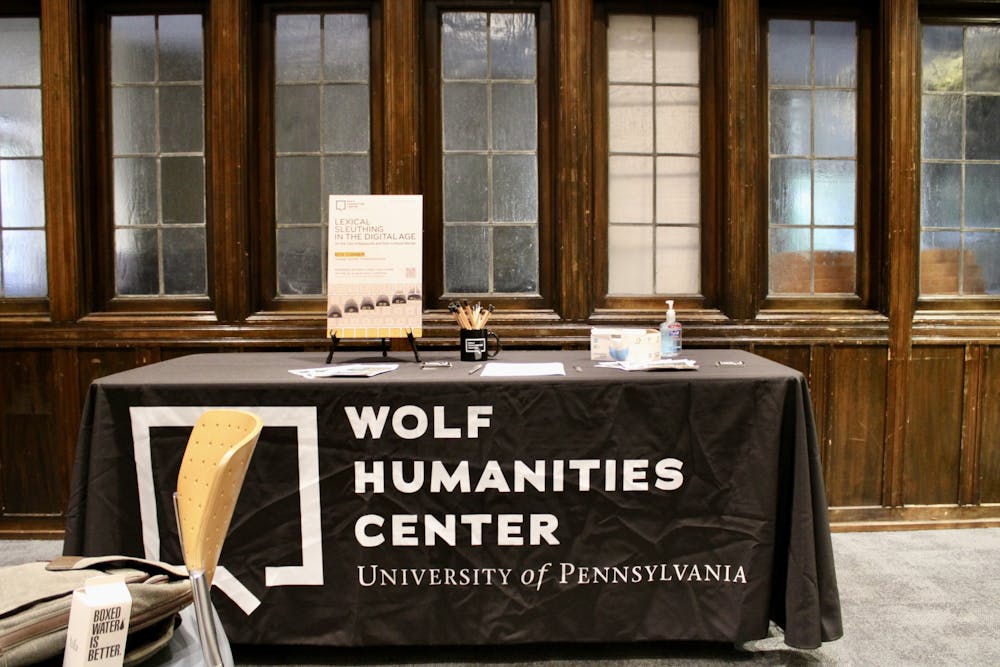
The Wolf Humanities Center hosted Wall Street Journal language columnist Ben Zimmer at the ARCH building for a talk titled “Lexical Sleuthing in the Digital Age: On the Trail of Keywords and their Cultural Worlds” on Oct. 9.
Zimmer — who was a research associate at Penn’s former Institute for Research in Cognitive Science from 2005 to 2006 — gave a presentation on lexicology and linguistics followed by a question and answer session with roughly 40 attendees. The event drew a crowd of linguists and language enthusiasts from Penn's campus and the Philadelphia area.
Zimmer’s talk examined the origins of keywords, which he defined as “broad categorical terms with contested meanings.” He emphasized that keywords often become politically charged, and he takes cues to write about ones that are repeated in the news.
“Words in our language are constantly open to reinterpretation and re-signification,” Zimmer said.
Zimmer described his approach to writing language columns as “a form of narrative lexicography, telling stories about words from their origins to how they moved through various cultural, social, and political worlds.”
Throughout the event, Zimmer referenced the novel “Keywords” by Welsh writer Raymond Williams, which he cited as being particularly influential in his career with its synthesis of lexicology, linguistics, and culture.
According to Zimmer, linguists and lexicographers trace developments of spoken language through everyday speech, citing evidence such as social media. His analysis of the rise of words like “rizz” and “demure” was met with laughter from the audience.
In 2005, Zimmer became a regular contributor to Language Log, an online blog founded by Penn linguistics professor Mark Liberman in 2003. He described his time as a writer as an “important stepping stone” in his career journey.
“[Language Log] helped me to develop a voice for writing about language for a more general audience, since I had come out of academia where the language can often be a little opaque for a lot of people to appreciate. From there I started writing for other places,” Zimmer said.
During the question and answer portion of the event, audience members questioned the origins of the word “jawn,” which Zimmer granted was a Philadelphia creation. When asked about how amateur lexicologists can develop skills to track down elusive words and figure out their trajectories, Zimmer suggested familiarizing oneself with the ways dictionaries treat languages. He also recommended looking for things that might be missing and educating oneself on linguistic structures.
Event attendee Roger Morey, who works with environmental health and safety at Penn, emphasized Zimmer’s background and perspective.
“I was looking forward to a humanities lecture of some sort, and I was very interested to hear about Ben, because he’s taken another pathway that’s not academic coming from a linguistic background,” Morey said.
Zimmer’s lecture was an installment in the Wolf Humanities Center’s “Forum on Keywords” program. Led by South Asia Studies professor Lisa Mitchell, the forum aims to explore the interdisciplinary study of mobile concepts and their evolving meanings across time, languages, and contexts. The center combines public events and seminars to investigate how keywords reflect historical forces, such as migration, colonization, and resistance, and consider the development of new lexicons in response to changing identities and fields of knowledge.
“One of the things about this forum is that it’s intended to be outward facing, public-facing, so not just for academics or professors and students, but for the general public as well,” Mitchell said. “We try to pick people who can communicate well with a wider audience.”
Mitchell emphasized Zimmer’s ability to draw in an audience with varying levels of familiarity with linguistics.
“I think he presented us with a new kind of method that isn’t just looking things up in the dictionary, but it’s trying to capture how words are used in everyday life," she said.
The Daily Pennsylvanian is an independent, student-run newspaper. Please consider making a donation to support the coverage that shapes the University. Your generosity ensures a future of strong journalism at Penn.
Donate







